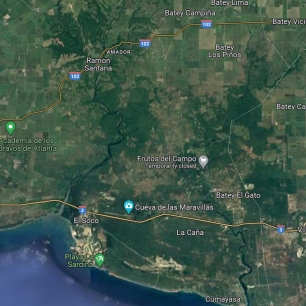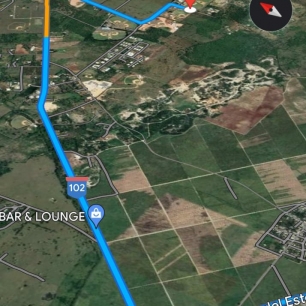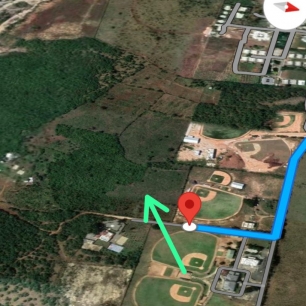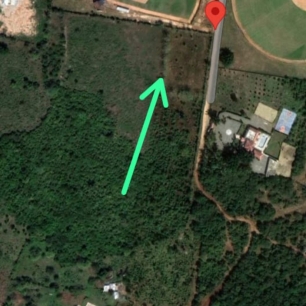Industries.
(Above: Plant location map. Click to enlarge and view in full details)
DOMINICAN ECOLOGICAL ENERGY COMPANY
FOCAL BENEFITS TO THE DOMINICAN REPUBLIC OF THE BIOFUEL PROJECT
The following is a delineation of the focal benefits to the Dominican Republic pertaining to the development of this biofuel project:
1.
The Dominican Republic is highly reliant upon the importation of fossil fuels from other nations, especially the United States and China, since virtually no petroleum is produced or otherwise acquired via oil and gas exploration. Therefore, with the DR having to expend monies from its Treasury, which thus diminishes funds available for further economic needs and development. If biofuel is developed via this project for production of SAF, biodiesel or other bio-based fuels, then the financial strain on the Dominican governmental economy will be substantially lessened. At this point, the Dominican government is wrestling with the increased costs of petrochemicals, due to the Russian/Ukrainian conflict and other inflation factors and on which the government controls the costs and pricing throughout the country. Therefore, with the production of these biofuels, the slavery of the Dominican Republic to the fuel controls by other countries and global economic stresses may be decreased and overall benefit the nation economically for its prosperity.
2.
Currently, the nuisance of sargassum is at an all time high. The pervasive influx of sargassum has a very negative impact on tourism, which is a leading economic factor benefiting the Dominican Republic. Recently, numerous news reports have measured the loss of tourism throughout the Caribbean and along the Atlantic coasts. With the cultivation of sargassum at sea and prior to its infestation of beaches, streams and other impacted areas (for instance, ports and shipping lanes), then the detrimental impact of sargassum can be reduced. As noted in the other documents provided to you, agronomic science has now been developed to process sargassum into fuels for various uses, especially SAF. All international airlines have executed agreements requiring the conversion of their operations to reduce negative climate impact.
3.
Under the terms of the Paris Climate Change Agreement, which was executed by 196 nations worldwide, "developed" countries, such as the United States, must provide financial resources to "developing" countries, such as the Dominican Republic. Such funds are generally managed by countries assigned by the United Nations. However, developing countries obtain greater financial benefits when they demonstrate the lessening of carbon emissions, whether by reduced use of fossil fuels, coal and other activities that have adversely contributed to global warming and the resulting negative climate damage. This lessening of carbon emissions then results in the developing country receiving "carbon credits" under the Paris Agreement and increasing the amount of monies and other financial benefits, including international investments. Therefore, with this biofuel project, the Dominican Republic is then positioned to receive even more financial benefits internationally by demonstrating the commitment and success of reduced carbon emissions. As noted above, all international airlines, including all of those serving the Dominican Republic, are committed to the reduction of carbon emissions by 30% by 2030 and by 50% by 2050. With the airlines' commitment and with the production of SAF in the Dominican Republic itself, then it is projected that costs of travel will likewise be reduced, since the SAF can be acquired locally and not imported.
4.
The construction and subsequent operations of the biofuel project produces tremendous employment and financial benefits within the Dominican Republic, with increased employment, wages, healthcare benefits and other employment-related aspects. It is therefore expected that the project will be required to hire, train and educate many people, as well as contribute to the schools and universities to facilitate a work force to enhance the company's production, management and overall operations.
5.
Currently, virtually all agricultural waste, particularly bagasse, is simply hauled to landfills where it is burned or otherwise disposed of via various environmentally adverse means. This biofuel project virtually eliminates this harm to the environment of the Dominican Republic, which has been experiencing numerous fires, which have also been attributed to drought brought on by harmful climate change. Therefore, the mechanical and chemical processes utilized by the biofuel plant eliminates this environmental harm being experienced by the Dominican Republic.
6.
The Development Plan of Action (which has been revised on a recurring basis), the subsequent phases of this project will address the utilization of municipal solid and landfill waste, through a patented circular-synthesis process, to produce biomass and biofuel, which may be used for electricity and other necessary and vital energy needs. The final phase is focused on recycling or otherwise using plastics so as to further reduce damage to the environment, provide further carbon credits and to save the oceans from such damaging products. These final two phases will only be ventured upon the completion of the first phase involving the use of sargassum and bagasse for the production of SAF and biodiesel.




